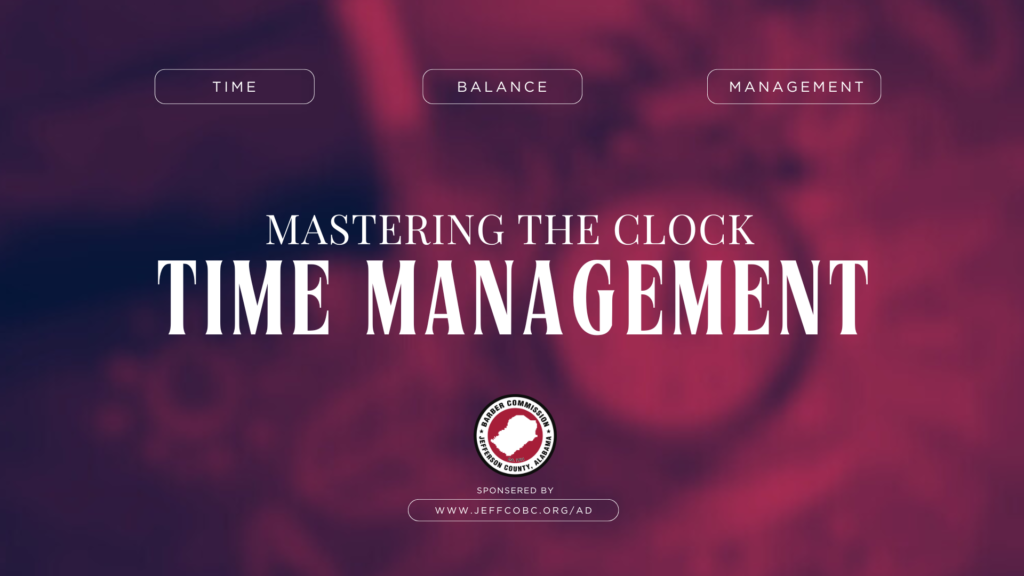
Estimated Read Time: 10 to 12 minutes.
If you’re the kind of barber who prides themselves on ambition, talent, and an unwavering drive to grow your career, chances are you’ve found yourself wishing for more time. The barbering life demands juggling appointments, perfecting your craft, staying ahead of trends, and somehow balancing all of that with your personal life.
Loving your job doesn’t mean you don’t want to manage it better—it just means you’re striving for more. More balance. More efficiency. More success. That’s what we’re here to explore: how you can master time management and reclaim control over your day-to-day.
In the fast-paced world of barbering, refining your time management skills can transform not only your work life but your entire existence. The rewards? Sharper focus. Elevated productivity. Reduced stress. Improved work-life balance. And, let’s not forget, a significant boost to your revenue.
So, how can you, the modern barber, maximize every second of your day? Let’s get into it.
Automate Client Bookings
Take a hard look at how much time you spend manually scheduling and communicating with clients. It’s often far more than you realize. While connecting personally with clients is essential, automation can handle the logistics. Implement an online booking tool directly into your website—one that syncs seamlessly with your schedule. This small shift can free up hours each week, giving you more time to focus on what you do best: barbering. And don’t worry about losing the human touch. If clients prefer calling in, accommodate them warmly, but gently guide them toward your automated system. Over time, they’ll come to appreciate the convenience, and you’ll reap the time-saving benefits.
Beyond convenience, automation reduces errors. Manual scheduling often leaves room for double bookings or missed appointments—both of which can lead to frustrated clients and unnecessary stress for you. Automated systems typically come with features like appointment reminders, cancellation tracking, and rescheduling options, giving you a stress-free way to manage your day. When your schedule flows smoothly, you can stay more present with each client, offering them a better experience and reinforcing your reputation as a professional who values their time.
Set Daily, Weekly, and Monthly Goals
Start each day, week, and month with intention. Dedicate a few minutes to defining your goals. Whether it’s perfecting a new skill, improving client retention, or simply staying on top of your appointments, writing these down creates clarity and direction. This practice might feel tedious at first, but it’s a game-changer. With your objectives clearly outlined, you can allocate your time more effectively, tackling tasks with precision and focus. Each moment has a purpose, and the result is an unmistakable surge in productivity.
Goal-setting isn’t just about big-picture aspirations—it’s about breaking them down into actionable steps. Daily goals keep you grounded, while weekly and monthly objectives give you a sense of progress. For example, if your monthly goal is to increase customer retention by 10%, your weekly goal might be to offer five regular clients a loyalty discount, and your daily task might involve sending personalized thank-you messages. By compartmentalizing your aspirations, you make them feel less daunting and more achievable.
Schedule Breaks, Vacations, and Time Off
The key to time management isn’t just about squeezing in more work—it’s about ensuring you have the energy to sustain it. This means scheduling breaks, holidays, and even lunch hours with the same rigor you apply to client appointments. Burnout is real, and it doesn’t discriminate. No matter how passionate you are, you need time to recharge. Step away from the clippers. Take that long weekend. Book a vacation. By prioritizing rest, you’re actually sharpening your ability to deliver exceptional results when you’re on the clock.
Moreover, scheduled time off improves creativity and decision-making. When you’re overworked, even small challenges can feel insurmountable. However, stepping away allows you to return with fresh eyes and renewed focus. Some of your best ideas and solutions will come when you’re not actively thinking about work. By scheduling downtime, you’re not just taking care of your mental and physical health—you’re investing in your long-term success.
Embrace Task Batching
Imagine this: instead of flitting between tasks all day—cleaning your shop, managing social media, tracking inventory—you dedicate blocks of time to focus exclusively on one area. That’s task batching, and it’s about to revolutionize your workflow. Take social media, for instance. Instead of posting daily, set aside a few hours at the start of the month to plan, write, and schedule all your posts. The result? You’re no longer scrambling for captions or hashtags in the middle of a busy day. This strategy isn’t limited to social media. Apply it to tasks like inventory management, staff meetings, and research. By grouping similar tasks together, you’ll streamline your workflow and free up mental space for creativity and problem-solving.
Task batching doesn’t just save time; it enhances focus. Switching between unrelated tasks can lead to mental fatigue and reduced efficiency. By dedicating uninterrupted time to a single category of work, you eliminate the cognitive load of constant transitions. For instance, if you batch your cleaning tasks on Sunday mornings, you won’t have to worry about tidying up during the week, freeing your mind to concentrate on clients and creativity.
Prioritize and Delegate
Not every task requires your personal attention. Learn to distinguish between what only you can do and what can be delegated. Hire a part-time assistant or lean on software tools to handle administrative tasks. By focusing your energy on high-priority areas, you’ll maximize your impact and minimize wasted time. Delegation isn’t a sign of weakness; it’s a strategy for success.
When you delegate, you’re also empowering others. Whether it’s a colleague taking over the inventory or a digital assistant managing your emails, delegation builds trust and teamwork. It also allows you to concentrate on the aspects of barbering that you’re most passionate about, ensuring your time is spent doing what you love and excel at.
Leverage Downtime
Every barber experiences downtime—those brief moments between appointments or cancellations. Instead of letting this time drift away, use it productively. Read up on new techniques, organize your tools, or draft ideas for your next marketing campaign. These small, proactive steps add up and help you stay ahead.
Downtime is also a great opportunity to focus on self-improvement. Consider taking an online course, networking with other professionals, or brainstorming innovative ways to improve client satisfaction. These quiet moments can be golden opportunities to grow your skill set and your business.
Reflect and Adjust
At the end of each day, take a moment to evaluate how you spent your time. What worked? What didn’t? This reflection doesn’t have to be lengthy, but it’s crucial. By identifying inefficiencies and celebrating wins, you’ll continuously refine your approach to time management.
Reflection is the gateway to growth. When you take stock of your day, you’re not just assessing your schedule—you’re learning about yourself. Maybe you discover that mornings are your most productive time, or perhaps you realize certain tasks drain more energy than they should. These insights are invaluable as you craft a routine that works for you.
Conclusion: Owning Your Time
Time is the one resource we can’t replenish, but with thoughtful management, you can stretch its value. Whether you’re automating bookings, batching tasks, or carving out moments for rest, every decision contributes to a more balanced and fulfilling barbering career.
Remember, being an exceptional barber isn’t just about skill with scissors; it’s about mastering your schedule, prioritizing wisely, and making every moment count. Time, after all, is the canvas on which you craft your success.


